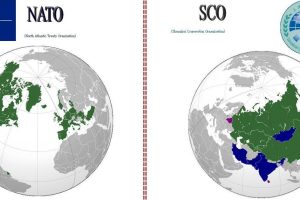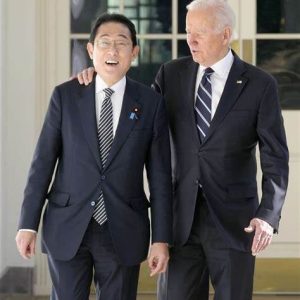In 1978, Deng Xiaoping set the course for reform and opening up, and made a major shift to a market economy system. In the 1980s, Deng Xiaoping ordered then Admiral Liu Huaqing to formulate a naval modernization plan. The United States, which wanted to use the Sino-Soviet confrontation to help contain the Soviet Union, temporarily supported China's naval modernization. After the collapse of the Soviet Union in 1991, a campaign was launched to view the soon-to-rise China as a threat, and in the 2010s, a new Cold War between the United States and China was declared. The "war on terrorism" filled the "Cold War void" from the dissolution of the Soviet Union, the end of the Cold War between the East and West, to the full-scale rise of the Cold War between the United States and China, and supported the interests of the US military-industrial complex. The Ukraine War should be seen as a proxy war between Ukraine and Russia during the Cold War between the United States and China. Unless the Japanese are freed from the deeply immersed American point of view, they will be crushed by the made-up China threat theory.
China's growing presence needs to be observed more calmly. For example, in 2019, Southeast Asian nations announced their own initiative, the ASEAN Outlook on the Indo-Pacific, as an alternative to the Indo-Pacific Initiative, a network encircling China centered on the United States, Britain, Japan, and Australia. This initiative aims to create an “Indo-Pacific region of dialogue and cooperation, not competition,” and is clearly a calm response that puts the United States, Britain, Japan, and Australia in check. For the Association of Southeast Asian Nations (ASEAN), China is the largest trade and investment partner, and building a mutually beneficial relationship with the neighboring giant, China, is essential for economic development.
 It goes without saying that it is possible for the Xi Jinping leadership of China to coexist with China on the economic front beyond the political system in order to bring the idea of "socialism" to the fore with the slogan of "a powerful modern socialist country." is. Not only Southeast Asian countries, but India, Pakistan, Central Asia, the Middle East, Africa, many countries in Central and South America, and the Global South have now left the United States and joined hands with China. Syria's return to the Arab League and reconciliation between Iran and Saudi Arabia are said to be symbols of this. The G77 Plus China issued a statement in hopes that the SCO would create a new international order in view of the avalanche of China-led accession to the Shanghai Cooperation Organization (SCO). In response to this, a new development bank (BRICS Bank) was established in Shanghai to replace the International Monetary Fund (IMF), the core of the post-war order by the United States, and Dilma Rousseff. The former president of Brazil was appointed president.
It goes without saying that it is possible for the Xi Jinping leadership of China to coexist with China on the economic front beyond the political system in order to bring the idea of "socialism" to the fore with the slogan of "a powerful modern socialist country." is. Not only Southeast Asian countries, but India, Pakistan, Central Asia, the Middle East, Africa, many countries in Central and South America, and the Global South have now left the United States and joined hands with China. Syria's return to the Arab League and reconciliation between Iran and Saudi Arabia are said to be symbols of this. The G77 Plus China issued a statement in hopes that the SCO would create a new international order in view of the avalanche of China-led accession to the Shanghai Cooperation Organization (SCO). In response to this, a new development bank (BRICS Bank) was established in Shanghai to replace the International Monetary Fund (IMF), the core of the post-war order by the United States, and Dilma Rousseff. The former president of Brazil was appointed president.
Even if the other country does not accept Chinese-style socialism, China will support the anti-government forces with camouflaged sabotage organizations such as civic groups and non-profit corporations, and in the name of "democratization", regime change = regime change. As a result, the “democratized” pro-American regime is deprived of sovereignty, especially diplomatic freedom, as a dependent state bound by Washington. The Potsdam Declaration of August 1945, which forced the democratization of Japan, was in a different form, but intended to place Japan semi-permanently under the enslavement of the United States and Great Britain. The aims of the United States and the United Kingdom were embodied in the form of the Japan-U.S. Security Arrangements. The reason why the United States was given a strong ``defeated neck'' in the form of the Japan-U.S. Security Treaty is that there is no ``economic and technological power'' as easy to use as Japan when it is controlled by a collar.
The government of Fumio Kishida is trying to achieve the goal of turning Japan into a military superpower under the control of the United States, which was carried out by the Shinzo Abe government for fear of bashing from the United States. The U.S. neoconservatives revived and made the most of the Abe administration in 2012, which “wanted to regain Japan” as a hegemonic and military power in Asia. The Abe Group has made the following points: (1) Revision of the Japanese constitution is an urgent issue in order to counter a huge neighboring country that might invade Japan; He claimed to bring back Japan (3) to expand defense spending, improve military technology, and foster Japanese military-related industries.
For the second Abe administration, whose slogans are "breaking away from the post-war regime" and "regaining a strong Japan," "China's threat to recapture the Senkaku Islands (Chinese name: Diaoyu Dao)" was a stroke of luck. In other words, China's threat has presented a once-in-a-lifetime chance to Japan's ultranationalists, who have worked hard to create a pretext for post-war Japan's regime change, the hollowing out of Article 9 of the Constitution. The United States and Britain tried to make the most of their military aspirations and great power orientation while controlling the Abe administration. However, at its core, the anti-American right-wing ideology of refusal of the Tokyo trial was boiling as a magma, and he was waiting for an opportunity to discard it.
The roots of the movement were Nobuaki Makino, Aisuke Kabayama, and Kijuro Shidehara, who were in favor of Britain and the United States during the pre-war period, and especially during the war. Kishida, a descendant of the Hiroikekai network, seems to have been a suitable person for the post-Abe post-Abe neoconservatives. Lightly armed forces were replaced by a large-scale military expansion, but Kishida, the leader of the weak fourth faction "Kochikai", was given power because it was a group that Washington could operate with peace of mind. The Abe group has effectively achieved its long-sought goal of amending Article 9 through the acceptance of the exercise of the right to collective self-defense, which almost 100% of constitutional scholars consider unconstitutional, and the implementation of the new security legislation. The Kishida group, which was restrained by constitutional revision, was unable to break through the revision of Article 9.
 [Photo] The leaders of Japan and the United States during their visit to the United States in January 2023. In June of the same year, U.S. President Biden said, "I persuaded Kishida," about the Kishida administration's significant increase in military spending, causing controversy. He made it clear that "Increasing military expenditures to more than 2% of gross domestic product (GDP)" was actually an instruction from the United States to the Japanese government.
[Photo] The leaders of Japan and the United States during their visit to the United States in January 2023. In June of the same year, U.S. President Biden said, "I persuaded Kishida," about the Kishida administration's significant increase in military spending, causing controversy. He made it clear that "Increasing military expenditures to more than 2% of gross domestic product (GDP)" was actually an instruction from the United States to the Japanese government.
Now, even those who are considered liberal controversialists in Japan today talk about “Putin Russia heading for dismantlement” with bright eyes and relaxed mouths. Even those who claim to be international political scientists have not seriously delved into the developments leading up to the 2014 Ukrainian Maidan coup and the 2022 Russian military invasion of Ukraine. On the contrary, he speaks shamelessly, saying that the Obama administration has stopped arms support to Ukraine. It was the Russian-backed rebels in eastern Ukraine who used force first, and the Ukrainian military was reportedly only trying to suppress them.
The battle over Ukraine is a breakthrough for the United States, Britain, and Anglo-Saxons to break up China and Russia and conquer Eurasia. Without this perspective, it is impossible to see through the movements of the modern world. They are preoccupied with the idea that communist China will go bankrupt after the dissolution of Russia. In the midst of a remarkable shift away from the United States, it is hard to believe that the G7 (the United States, Europe, and Japan) can stop the torrent of efforts by the Global South to achieve full-fledged independence from the former colonial powers and Western countries, with China at the core. This is because the Chinese threat was created by the United States and Britain. The “weakening Xi Jinping regime” propaganda is repeated daily.
